Post by Badreddine™ on Apr 8, 2016 13:11:42 GMT

Senate Security Official Handbook
Contents
1.Introduction
2. Positions in Senate Security
3. Duties as Security
4. Vehicles and Weapons
5. Uniforms
6. Communication codes
7. Punishment and disciplinary system
Introduction
Official handbook for the Senate Security Division. This handbook contains all info and knowledge in becomingan successful bodyguard working for the Senate. This handbook will contain what and what not to do in situations and other information about Senate.
You will find the Senate Security lockers on the first floor, the room to the right after you exit the stairway.
This will be ordered from low-high ranks.
(The do's and do not's are basically all the same, using common sense. They do change though.)
Probationary Security Agent ((R0)) - This is where you will start, right from the bottom. During your time at this position you will be enlisted onto the Training Program and Trained everything you need to know. Once you're ready, you'll progress onto regular Agent.
Positions in Senate Security - Information About Them
You will find the Senate Security lockers on the first floor, the room to the right after you exit the stairway.
This will be ordered from low-high ranks.
(The do's and do not's are basically all the same, using common sense. They do change though.)
Probationary Security Agent ((R0)) - This is where you will start, right from the bottom. During your time at this position you will be enlisted onto the Training Program and Trained everything you need to know. Once you're ready, you'll progress onto regular Agent.
Do's
• Listen to your higher positioned Agents and Staff.
• If unsure, always ask
• Follow the Force Matrix
• Follow the general rules
Do not's
• Disobey direct orders from higher positioned Agents or Staff (strikeable)
• Mess around, acting immature and so on (strikeable)
• Protect without permission
Regular Security Agent ((R1)) - Once you've passed all of your trainings and your instructor is happy that you know everything required, you will be promoted to Regular Security Agent. This means that you are not supervised 24/7, but this also carries more responsibilities.
Do's
• Listen to your higher positioned Agents and Staff.
• Follow the Force Matrix.
• Guide Probationary Agents and show them the ropes.
• Be eager to learn more about your job.
• Follow the general rules.
Do not's
• Mess around.
• Think you know it all, because you're not at the bottom.
• Boss around lower ranks.
Senior Security Agent ((R2)) - So, you've been working under the Governor for quite a while now, you're getting to know who everyone is and what they do. You will now be fully trusted and often aspired to do well. Again, with this change - your position is higher, but you've got more responsibilities to go by. Upside, more freedom too. You will be supervised less but if caught doing something wrong the actions taken upon you will be more extensive.
Do's
• Ask questions about the Training Program, look like you're eager to learn.
• Listen to your higher positioned Agents and Staff.
• If unsure, always ask
• Follow the Force Matrix
• Follow the general rules
Do not's
• Disobey direct orders from higher positioned Agents or Staff (strikeable)
• Mess around, acting immature and so on (strikeable)
• Protect without permission
Regular Security Agent ((R1)) - Once you've passed all of your trainings and your instructor is happy that you know everything required, you will be promoted to Regular Security Agent. This means that you are not supervised 24/7, but this also carries more responsibilities.
Do's
• Set a good example.
• Follow the Force Matrix.
• Guide Probationary Agents and show them the ropes.
• Give trainings to Probationary Agents.
• Encourage everyone to do well.
• Take some time to teach Probationary Agents about their trainings and such in detail.
• Follow the general rules.
• Train to the tip of your knowledge.
Do not's
• Mess around.
• Think you know everything there is to know.
• Boss around lower ranks. You ask them, don't ***** at them.
• Discourage other members.
Jobs you can do
Whilst working, make sure that you are always doing something. You don't want to be bored. A worker that is doing nothing isn't seen as a valuable asset to the Security Team. If you're not sure what you can do, then find yourself some things you can do until a Senator or higher authority issues an order.
Something's you can do when not given orders:
City Hall patrol - Walk on foot around the City Hall looking for any suspicious activity, dangers or threats that could be arising from outside. If you're a Probationary Agent you shouldn't be doing this unless accompanied by a Regular Agent.
Inspection of City Hall - You could do a little examination of the City Hall by checking all the rooms, looking for trespassers inside the building. If you find trespassers, order them to get out immediately, if they fail to do that call for the Los Santos Police Department. Check for anything inside of the City Hall which could pose a danger.
Vehicles and Weaponry
Vehicles
Limousine
The Limousine's that are used by the Senate Security are bulletproof, and is used to transport Senators all around the city; in style. Inside (at the back) there is a mini-bar with soft alcoholic beverages and soft drinks. Comfy seats so the senators can ride in style.
Picture:

Premier
The Premier's that are used by Senate Security have bulletproof windows, and is used to transport up to three Senators around the city, or to a different location. Comfy seats all around, heated front two seats. Senators won't be complaining travelling in this.
Picture:

Weaponry
All the weaponry you'll need working as Security will be in your lockers, which are located on the first floor - take a right and it's the first door on the right. You'll find all of your stuff there that you'll need. Below you'll find a little bit of information on each gun available, and who can use them.
Remington Pump-Action

The Remington Pump-Action shotgun is a low range, but very powerful shotgun. Should only really be used in larger situations. Permission to use this weapon is granted by Regular Agents.
Desert Eagle
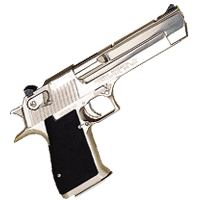
This is the main weapon you'll be using, working as Senate Security. It can hold 8 rounds (at 0.44 caliber). Can be used at any position within the Security.
MP5
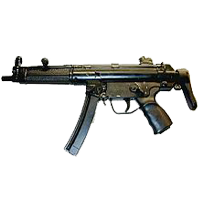
The MP5A should only be used when under attack, to return fire. It's a high rate-of-fire weapon, which will destroy the enemy from medium distance. Permission can be granted from a Regular Agent to use this weapon.
Remington

The Remington that Senate Security use is a bolt-action which is used to annihilate the enemy from afar. Permission can only be granted from a Senior Agent to use this weapon.
M4A1
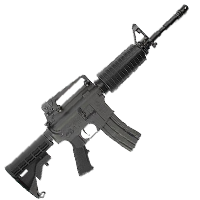
The M4A1 Carbine assault rifle is a heavy fire weapon with a medium fire rate, but a very high velocity rate and will literally shoot through the target. Permission can be granted from Senior Agent of above to use this weapon. Should only be used in heavy situations.
Uniforms
Whilst working as Senate Security you have two different uniforms you can choose from if you're a male. If you're a female then you only have once choice of uniform. Uniforms should be worn when you're on duty at all times and the appropriate one should be used unless given permission to do otherwise.
Here are the male uniforms.
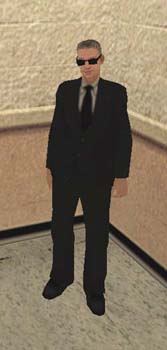
OR
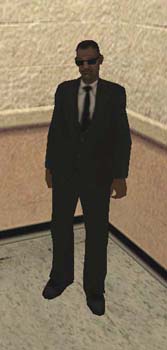
If you're a female, you need to wear the following uniform.

Communication Codes
Yes, that's right. You'll need to know a few codes, that's all. Don't stress about it, nowhere near as many as you need to know in a proper LEO career.
10-1 - Go to/regroup at
10-4 - Copy that/affirmative
10-10 - Negative
10-14 - Pick up at "x"
10-20 - Location
10-99 - Situation concluded
Status 1 - Going off duty
Status 2 - On duty
Status 3 - Taking a break
That's it, just memorize those codes and you're good to go.
Punishment and Disciplinary System
As many places do, they enforce a strike system. We kind of go along the same lines, but it's more flexible. This could be a good, or bad thing for the person that has done something wrong.
[X] = One strike
[XX] = Two strikes
[XXX] = Three strikes.
Before even getting one strike, you will get a verbal warning. The strikes are just to mark the severity of the situation that's happened, there's no set-in-stone punishment.
One strike will generally just get you watched over more. More things that you do will be supervised more heavily. No severe action will be taken at this point.
Two strikes can earn you either; demotion or a suspension. This, or a termination of the employee's pay for the week.
Three strikes can earn you; demotion, suspension or a firing. If you get three strikes then the pay will be terminated for the month and you will most likely be fired. If you're suspended, you'll generally get a demotion after you get back from your suspension.



